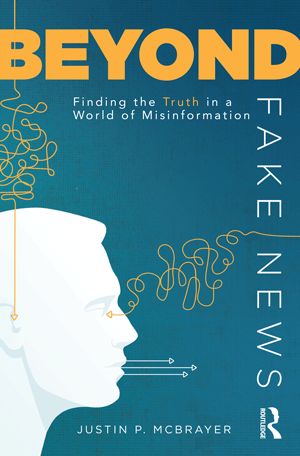
JUSTIN P. MCBRAYER

research
Aristotle says that philosophy begins in wonder.
I have never been able to restrict my wonder to just one domain of philosophy and as a result, my research ranges from philosophy of religion to epistemology to ethics. But no matter the field, my goal is to produce clear, non-technical philosophy that helps us to think better about the world in which we find ourselves. In 2018, I was recognized with the Featured Scholar award at Fort Lewis College. Many of my most recent projects have been collaborative, and I am interested in working with academics from other fields to tackle questions on the boundaries of traditional discipline.
Short pieces written for popular audiences on pressing issues & published in popular venues like newspapers or magazines.
"When is Seeing Nothing Evidence of Nothing?" Logoi, 2023.
"Diverse Viewpoints, One Truth," Areo, April 2022.
"What is diversity? And why is it valuable?," Quillette, October 2021.
Higher education continues to talk about diversity in the abstract. But such talk is vacuous. There's no such thing as diversity. I show that there are two good reasons to be conceptually clear about our diversity goals. First, we should specify what kind of diversity we're talking about, and second, we should specify exactly why that sort of diversity if valuable.
"Go with what we know on vaccine, not fear of the unknown," Albuquerque Journal, October 2021.
Many people are hesitant to get the COVID vaccine for fear of unknown side effects. That's irrational because it factors only some of the unknowns into the expected value calculation.
"Even Truth U Cares About Social Justice," Heterodox Academy, May 2021.
Even if the goal of the university is the discovery or transmission of truth, there are just and unjust ways of doing so. Truth is the goal, but justice is a side constraint.
"Why Fact Checking Fails to Change Minds,"Durango Herald, December 2020.
The standard solution to fight fake news is to provide people with better critical thinking tools or better information. This solution is a failure because much of the time we don't really want the truth. We want to belong.
"Varieties of Moral Relativism," Emergence of Relativism Project, University of Vienna, Austria, September 2018
I distinguish three different senses of moral relativism and show that everyone is a relativist in some sense. But that's consistent with endorsing an objective moral standard at the principle level.
"The Case for Preserving Bears Ears," (with Sarah Roberts-Cady) Ethics, Policy & Environment, March 2018
Sarah and I argue that both conservative and liberal views on the federal protection of Bears Ears National Monument are confused. Against the right, President Trump's executive action reduced local control, and against the left, the primary good of Bears Ears is not environmental. Instead, it's the cultural component that is worth preserving.
"The Morality of Getting Divorced," Philosophy Now, June/July 2017
Since marital promises are serious ones, the decision to get divorced is morally fraught. We ought not treat divorce casually. I outline conditions that make for morally permissible divorce and morally wrong divorce.
"Why Should the Line be Drawn at Chemical Weapons?" The Denver Post, April 2017
International law draws a bright line between governments who kill their people or their enemies with conventional weaponry versus those who do so with chemical weaponry. I argue that it's a distinction without a moral difference.
"Why Christians Must Reject Alternative Facts," Dallas News, February 2017
Prominent defenders of President Trump often appeal to "alternative facts" to justify his decisions or actions. I argue that such a tactic is inconsistent with the Christian commitment to objective truth.
"Africa & the Problem of Evil," The Critique, September/October 2016
Belief in God is higher in Africa than just about any other place on earth. And yet people living in Africa are faced with evils the like of which the average Westerner never confronts. So how can belief in God be so high, and is it reasonable in the face of the counterevidence of evil?
"Guns on the Free Market? Sure, if the Penalty for Sellers is Stiff," The Orlando Sentinel, August 2016
A combination of free markets, government sanctions, and personal interest can help us to make progress on gun violence in America. Instead of requiring pre-sale background checks on just some purchases, we should eliminate pre-sale requirements and punish sellers who put guns in the wrong hands.
"This Land is Your Land. Or is it?" New York Times, January 2016
Property disputes in the US like the one at the Malheur National Wildlife in 2016 are based on a flawed view of just property ownership. This view--popular among conservatives--says that someone owns a piece of property just in case it was historically passed down to them in the right way. While John Locke might have been happy with such a view, none of us should be.
"Why Our Children Don't Think there are Moral Facts," New York Times, March 2015 [29th most-read story for 2015, translated into Italian and Arabic]
Teachers across America teach kids that facts are one thing, opinions are another, and that all claims about values are opinions. I argue that this distinction is both conceptually confused and harmful. In particuarl, it sends a clear message to kids that morality is either relative or non-existant.
For more philosophy dished out in bite-sized pieces for a general audience, see my blog, Space to Think.
BOOK REVIEWS
Review (with Egan Wynne) of Progressive Atheism by J.L. Schellenberg, International Journal for Philosophy of Religion
Review (with Theresa O'Hare) of Challenges to Moral and Religious Belief edited by Bergmann and Kain, Analysis
Review of Pragmatic Encroachment, Religious Belief, and Practice by Aaron Rizzieri, Notre Dame Philosophical Reviews
Review (with Douglas Moore) of Religious Faith & Intellectual Virtue edited by Callahan and O'Connor, Religious Studies
Review (with Caleb Ontiveros) of What's Wrong with Homosexuality? by John Corvino, Social Theory & Practice




